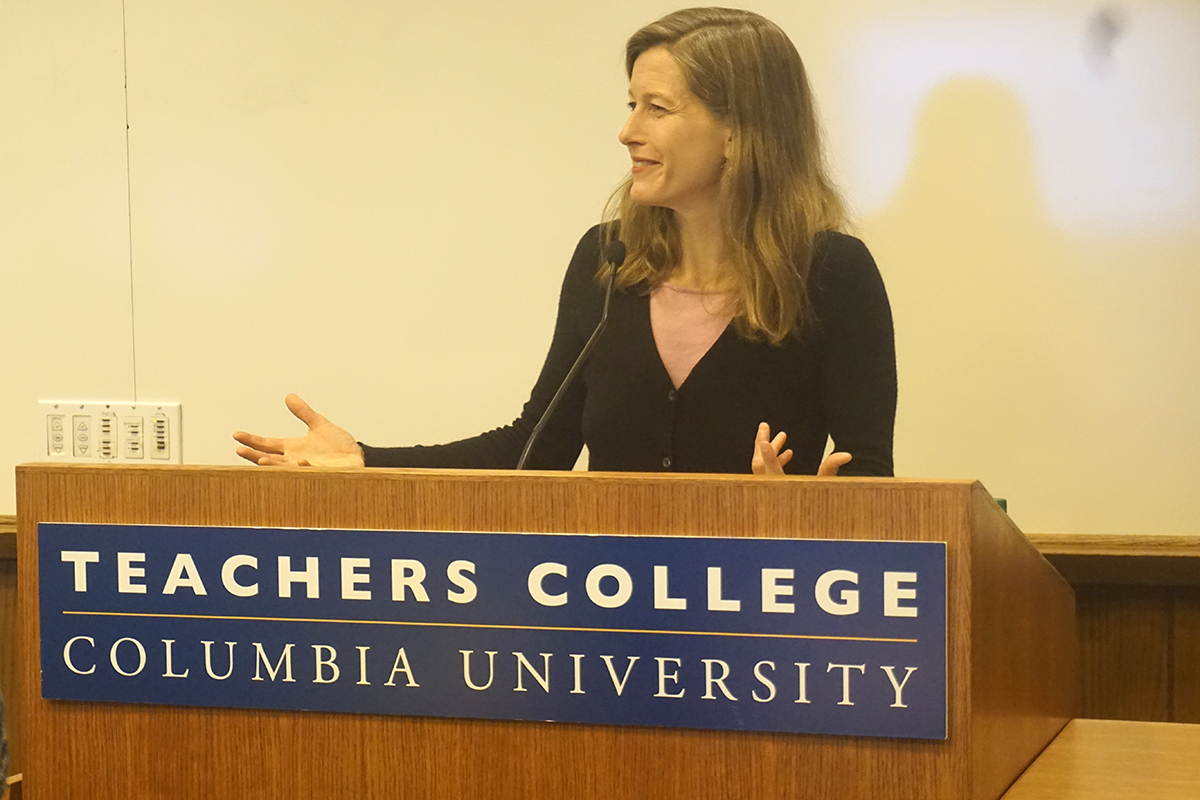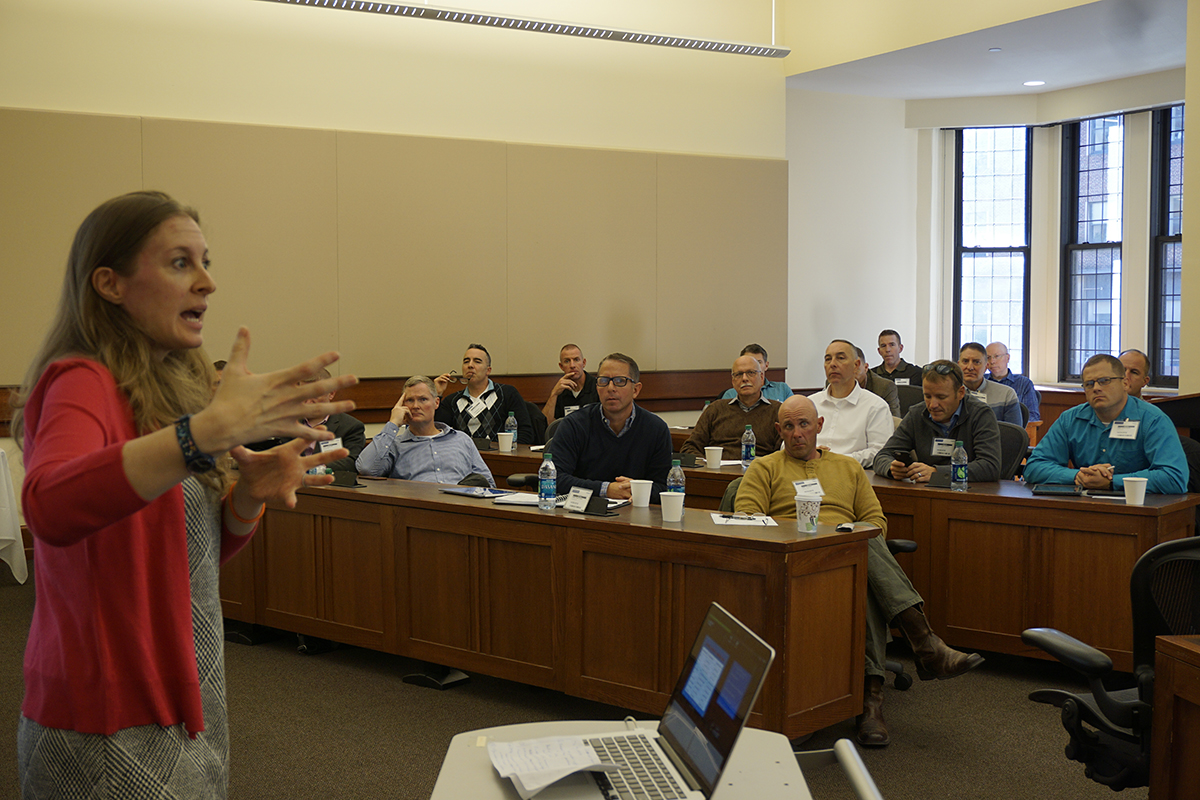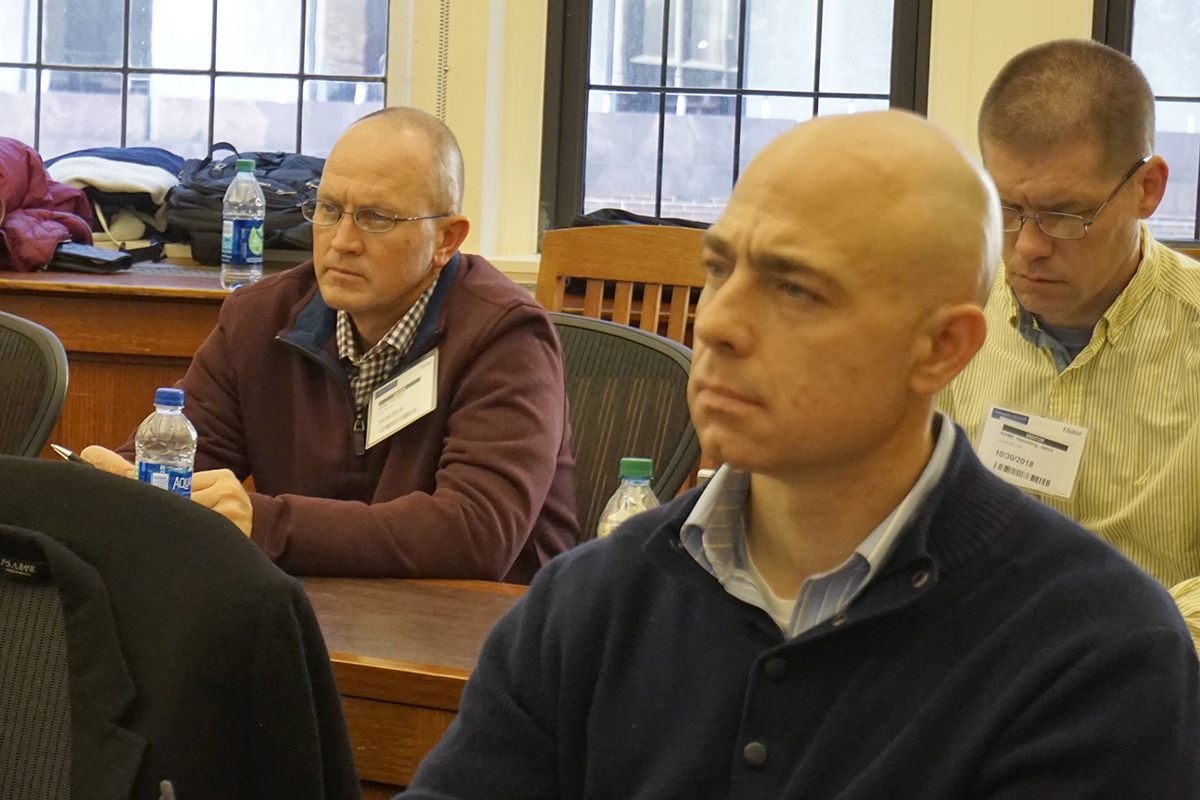Treatments for post-traumatic stress disorder (PTSD) can help military veterans recover from the horrors of violence they have witnessed or been subjected to. But what about the trauma caused by soldiers’ participation in violence?
“Moral injury” is the term that psychologists such as Lisa Miller, Professor of Psychology & Education, uses to describe this kind of trauma, and she believes that spiritual treatment offers the best hope for healing.
“Something that is before God cannot necessarily be fixed by cognitive therapy,” Miller told a visiting group of 24 U.S. Army chaplains in late October in a presentation titled “Spirituality, Trauma and Suicide in the Military.” “Spirituality means there are not just two people in the room. It means there are three in the room to help frame the treatment.”
Something that is before God cannot necessarily be fixed by cognitive therapy. Spirituality means there are not just two people in the room. It means there are three in the room to help frame the treatment.”
—Lisa Miller
Over the past two decades, Miller, Founder of the TC Spirituality Mind Body Institute (SMBI), has repeatedly broken new ground with studies that have demonstrated the positive impact of faith in combating depression and strengthening brain regions associated with positive emotions. Several months ago, she received a call from the Pentagon.
“The suicide rate among military veterans is twice that of the general public,” Miller says. “They wanted to know if our studies on the science of spirituality could benefit military clergy working with soldiers and veterans contending Post-Traumatic Stress Disorder, as well as Depression and Anxiety.”
The result was the visit to TC by the 24 chaplains, who are part of a professional development program initiated by Colonel Jonathan McGraw, chaplain and Director of Army Chaplain Corps Strategic Initiatives.
[For another story on spirituality and science, read about Karenna Gore's talk, delivered at the SMBI Winter Intensive, on why the environmental sustainability movement needs people of faith to participate. For more on human resilience to emotional trauma, read stories on work by TC's Resilience Center for Veterans & Families on the impact of "transition stress" on military veterans and on its studies of short-term therapy to help veterans cope with transition stress.]

CHAMPIONING AN ECO-MINISTRY Karenna Gore spoke at the Winter Intensive session of TC's Spirituality Mind Body Institute. Her topic: the role that religions can play in addressing climate change.
“We are religious practitioners, so we know the practice and we know the impact of war on human beings,” said McGraw. “But this helped us get behind the curtain,”
SMBI brain development studies show that the “inner compass” influencing self-awareness and introspection tends to manifest itself in young people between the ages of 15 to 24, Miller told the chaplains – an age range that coincides with the peak years for military enlistment.
During the past decade, enlistment has often meant deployment to active combat duty in Afghanistan and Iraq. According to the U.S. Department of Veterans Affairs, an estimated 11-20 percent of Iraq and Afghan veterans are afflicted with Post-Traumatic Stress Disorder.
Miller reminded the chaplains that they occupy a “powerful seat” from which to cultivate the spiritual growth that can be used to counter the worst repercussions of trauma. “You are the US Army’s great resource for optimal decision making, resilience and fitness, reaching all levels of rank.”
“You are the embodiment of spiritual life,” she said. “And when you speak from your core you are giving others permission to do so as well. You connect spiritual involvement to the faith community.”
Miller’s remarks were augmented by a teleconferenced presentation from Kenneth Pargament, a Professor Emeritus of Psychology at Bowling Green State University and authority on spiritual-based responses to trauma.
Pargament cited a 2015 study that shows young people conflicted by religion and spirituality are more likely to be depressed, anxious, dissatisfied, unhappy and socially isolated.
Citing another study, Pargament said when those issues are exacerbated by combat, veterans who struggle with spirituality may be at greater risk to develop symptoms of PTSD.
“We do a disservice to young people by not helping them address the complexities of spiritual life,” Pargament said.
In addressing a room full of chaplains, Miller and Pargament were, on one level, preaching to the choir.
“Even great scientists like Sir Isaac Newton and Louis Pasteur believed that science and study deepened their faith in God,” said Major J.R. Lorenzen, stationed at the Fort Lewis Military Base in Washington State. a former ceramic engineer in the tech industry who said he was drawn to the chaplaincy by his faith and a sense of patriotism. “So, to me, science and faith are not at odds with each other – they actually strengthen and reinforce each other.”
But more broadly, the chaplains’ visit to TC was only the start of what is shaping up as a much longer-term conversation around the impact of spirituality in prevention, treatment, training, and decision making. At the invitation of top army officials, Miller subsequently traveled to the Pentagon to further detail SMBI research and identify the tools the TC studies suggest can be used to prevent and reverse the psychological and spiritual damage of trauma.
"I’m really gratified by the official response,” Miller says, “but the most rewarding aspect of this was the connection I felt with the chaplains themselves. As they were leaving, one of them told me, ‘You are one of us.’ It was really one of the high points of my career.”
The most rewarding aspect of this was the connection I felt with the chaplains themselves. As they were leaving, one of them told me, ‘You are one of us.’ It was really one of the high points of my career."
— Lisa Miller
The Pentagon in turn thanked Miller for her efforts by providing a contingent of chaplains the opportunity to interact with SMBI students and graduates attending the program’s annual Winter Intensive Seminar in January.

ACTUALLY, LOTS OF PEOPLE IN THE ROOM Twenty-four chaplains participated in the workshop hosted by Lisa Miller. Here, TC doctoral student Micheline Anderson leads discussion.
The presentations featured dramatic re-enactments by former Army Chaplain Richard Stenbakken, including an interpretation of the moral quandary that confronted Henry Gereke, the Army chaplain assigned to minister the spiritual needs of Hermann Goering and fellow Nazis in the Nuremburg trials held in the wake of World War II.
In an open discussion on spiritual and emotional growth, Major Jim Fisher, Chief of Research and Development and Strategic Initiatives for the Chief of Chaplains, clarified why the over-arching purpose of military chaplains is not unlike that of SMBI faculty, students and alumni.
“I tend to want to fix things,” Fisher told the seminar. “But the kinds of things people share with me are not only unbelievable but sometimes unbearable. That’s why I do what I do. And the key is listening.” – Steve Giegerich
The Winter Intensive is part of the SMBI master’s program, which includes 10 days in the summer and four in the winter. The intensive offers a blended learning format, with students of all ages flying to TC from around the world. Click here to learn more.
